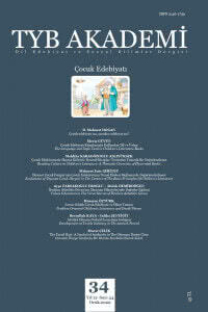İsrail’de Vatan ve Ulus Algısı
The Perception of Homeland and Nation in Israel
___
- Herzl, Theodor. The Jewish State, New York: Dover Publications, 1988. (İlk basımı Der Judenstaat 1896 Viyana)
- Hess, Moses, Rome and Jerusalem: A study in Jewish Nationalism. New York, Bloch Publishing, 1943.
- Hess, Moses, Rom und Jerusalem: Die letzte Nationalitaetsfrage, Briefe und Noten, Leipzig, Kaufmann, 1899.
- Kimmerling, Baruch, The invention and Decline of Israeliness: State, Society, and the Military. Berkeley: University of California Press, 2005.
- Lustick, Ian. For the Land and the Lord: Jewish Fundamentalism in Israel. New York: Council on Foreign Relations Press, 1988.
- Pinsker, Leo. Autoemanzipation: Mahnruf an Seine Stammgenossen. Von einem russichen juden. Berlin: jüdischer Verlag, 1920.
- Sand, Shlomo. The invention of the Jewish people. Londra: Verso, 2009. (İlk basım: Matai veeich humtza haam hayehudi, Tel Aviv: Resling, 2008)
- Segev, Tom. Elvis in Jerusalem: Post-Zionism and Americanization of Israel. New York: Metropolitan Books, Henry Holt, 2002. (Orijinal Adı Hatzionim hahadashim).
- Shelef, Nadav. Evolving Nationalism: Homeland, Identity, and Religion in Israel, 1925- 2005. Ithaca: Cornell University Press, 2010.
- Sternhell, Zeev. The founding myths of Israel: Nationalism, Socialism and the Making of the Jewish State. Princeton: Princeton University Press, 1998.
- Waxman, Dov. The Pursuit of Peace and the Crisis of Israeli Identity: Defending/Defining the Nation. New York: Palgrave, 2006.
- Zerubavel, Yael. Recovered Roots: Collective Memory and the Making of the Israeli national Tradition. Chicago: University of Chicago Press, 1995.
- ISSN: 2146-1759
- Yayın Aralığı: 3
- Başlangıç: 2011
- Yayıncı: Mustafa Ekici
Modern İsrail’de Karâî Olmak: Mısır Kökenli Karaîlerin İsrail’deki Sorunları
İsrail ve Filistin İlişkilerinin Sosyal, Siyasal, Dinî ve Kültürel Boyutları
İsrail’de Vatan ve Ulus Algısı
İsrail: Kutsal Halk, Kutsal Ülke
Kutsal Topraklarda Kurulan Bir Haçlı Devleti: Regnum Ierusalem- Kudüs Krallığı
Osmanlı Hâkimiyetinden İsrail İşgaline: Kudüs’ün Gönüllü Sakinleri
İsrail Tarih Ders Kitaplarının (1948-2014) Gözünden Tanzimat’a Kadar Osmanlı-Yahudi İlişkileri
